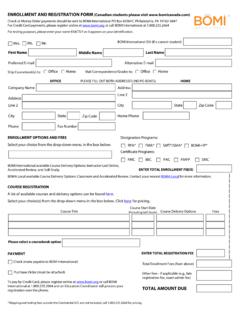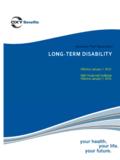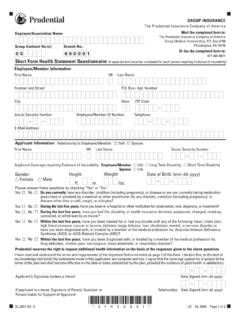Transcription of Employer Group Waiver Plans - bettermedicarealliance.org
1 1090 Vermont Ave, NW, Suite 1250 | Washington, DC 20005 | (202) 735-0037 | Group Waiver PlansCurrent Issues, Evolution & Policy Recommendations WHITE PAPER MARCH 2018 BMA POLICY RECOMMENDATIONS1. Adjust current rate setting to capture differences in the use of HMO and PPO Do not make changes that result in reductions to EGWP payments to minimize disruption and maintain stability in the Educate state and local retirement systems, employers, and union retiree Plans on the benefits of Encourage greater access to EGWPs in rural markets. 5. Enable Professional or Group Associations to utilize Simplify the EGWP enrollment process.
2 7. Engage with EGWP stakeholders before proposing or finalizing program Summary Employer Group Waiver Plans (EGWPs), also known as Employer retiree Medicare Advantage health Plans are a type of health plan offered by a public or private Employer to its retiree population. There are currently million retirees in EGWPs out of nearly 20 million Medicare Advantage beneficiaries. They represent a successful public-private partnership that addresses the health care needs of an important segment of today s retirees. EGWPs provide flexibility, value, and innovation to move providers towards high-value, high-quality care, improving the health care experience for physicians and their patients.
3 White Paper: Employer Group Waiver Plans : Current Issues, Evolution & Policy Recommendations 2 EGWPs successfully enable employers nationwide to maintain consistent benefits and contain costs for health coverage in retirement for enrollees. Employers, state and local governments, and unions increasingly rely on Employer retiree Medicare Advantage health Plans to sustain their promise to provide health benefits to retirees. Prior to 2017, EGWPs were paid using a bid process that mirrors individual Medicare Advantage. For 2017, the Centers for Medicare & Medicaid Services (CMS) phased-in a payment methodology whereby rates are set using individual Medicare Advantage health plan bids rather than EGWP bids, which resulted in reduced payments to EGWPs.
4 For 2018, CMS froze the phase-in of the new methodology due to concerns about potential disruption to the program. For 2019, CMS is proposing to fully transition to using only individual Medicare Advantage health plan bids to calculate the bid-to-benchmark ratios used to set EGWP payments. The new payment calculation fails to account for the unique geographic attributes of EGWPs. Fully phasing in the previously proposed methodology from 2017 and failing to account for the difference in penetration of Health Maintenance Organizations (HMOs) and Preferred Provider Organizations (PPOs) in EGWPs, would have a disruptive effect on employers and beneficiaries who count on EGWPs to provide continuity in Medicare Advantage benefits and affordability.
5 In the 2019 Advance Rate Notice Call Letter, CMS acknowledged the need for a more accurate methodology that accounts for the unique characteristics in EGWPs and requested feedback on possible This White Paper offers background on EGWPs and recommendations going forward, given this request and the potential changes that may be made to payment methodology by CMS for EGWPs starting in January Medicare Alliance (BMA) agrees it is important to build on the success of EGWPs across the country and recommends that: CMS should modify the current rate-setting methodology to capture the differences in enrollment patterns in EGWPs that results in the use of PPOs rather than HMOs.
6 CMS should avoid further cuts to EGWP payments to stabilize and minimize disruption to the market. To grow the EGWP market in underserved areas, CMS should modify direct contracting requirements to encourage greater access to EGWPs in rural markets. CMS should modify allowable Employer entities to enable professional or Group associations to access EGWPs. CMS should simplify the EGWP enrollment process to improve engagement with stakeholders who would benefit from Employer retiree Medicare Advantage coverage. White Paper: Employer Group Waiver Plans : Current Issues, Evolution & Policy Recommendations 3 Overview of EGWPs Public and private employers who offer health care benefits to their retirees have a choice to deliver those benefits through a public-private Waiver program under Medicare Advantage known as EGWPs.
7 Employer retiree Medicare Advantage health Plans currently provide coverage to over 20 percent of Medicare Advantage Today, EGWPs are an important comprehensive option for private companies, state and local governments, and by the Medicare Modernization Act of 2003, EGWPs are a type of Medicare Advantage plan with the ability to offer benefits to retirees who receive retiree health coverage through their former public or private Employer . Beneficiaries enrollment in EGWPs is based on Employer - or union-sponsored Group health Plans . Employers may enter into contracts with Medicare Advantage Plans to offer Medicare benefits to employees.
8 There are two basic categories of EGWPs, 1) 800 series EGWPs offered by health Plans to employers and unions 2) Direct Contract EGWPs offered by employers or unions that directly contract with CMS to offer health Plans . EGWPs can be either self-insured or fully insured, and employers may help reduce cost sharing for offer Medicare Advantage coverage, which includes all Medicare Part A (hospital) and Part B (physician) Traditional Fee-For-Service (FFS) Medicare benefits, in addition to supplemental benefits, out-of-pocket cost protections, and innovations to enhance beneficiary care. CMS facilitates the offering of EGWPs and waives certain requirements that hinder benefit design or enrollment .
9 EGWPs must follow all Medicare Advantage and Part D prescription drug requirements, except those that are explicitly waived. Waivers enable EGWPs to provide customized benefits, tailored beneficiary educational materials, and more flexible enrollment procedures. The EGWP payment methodology was previously based on a bidding process that mirrored individual Medicare Advantage, taking into account geographic costs in the Employer s county, as well as the broader provider network necessary to meet retirees health needs. In 2017, CMS decided to terminate the EGWP bidding process and replace it with payment amounts for EGWPs in each county.
10 CMS has proposed setting payment rates based on individual Medicare Advantage health plan bids to calculate bid-to-benchmark ratios. enrollment in individual Medicare Advantage health Plans has resulted in 73% enrollment in health maintenance organization (HMO), while only 25% of EGWPs enrollees are in HMOs. The majority of EGWPs, 76%, are preferred provider organization (PPOs) which drives up the bid-to-benchmark ratios because it is more expensive to cover beneficiaries over larger geographic areas. In the 2019 Advance Rate Notice Call letter, CMS stated that it is also considering adding an adjustment to the EGWP payment formula to account for the difference in the proportion of beneficiaries enrolled in HMOs vs.






